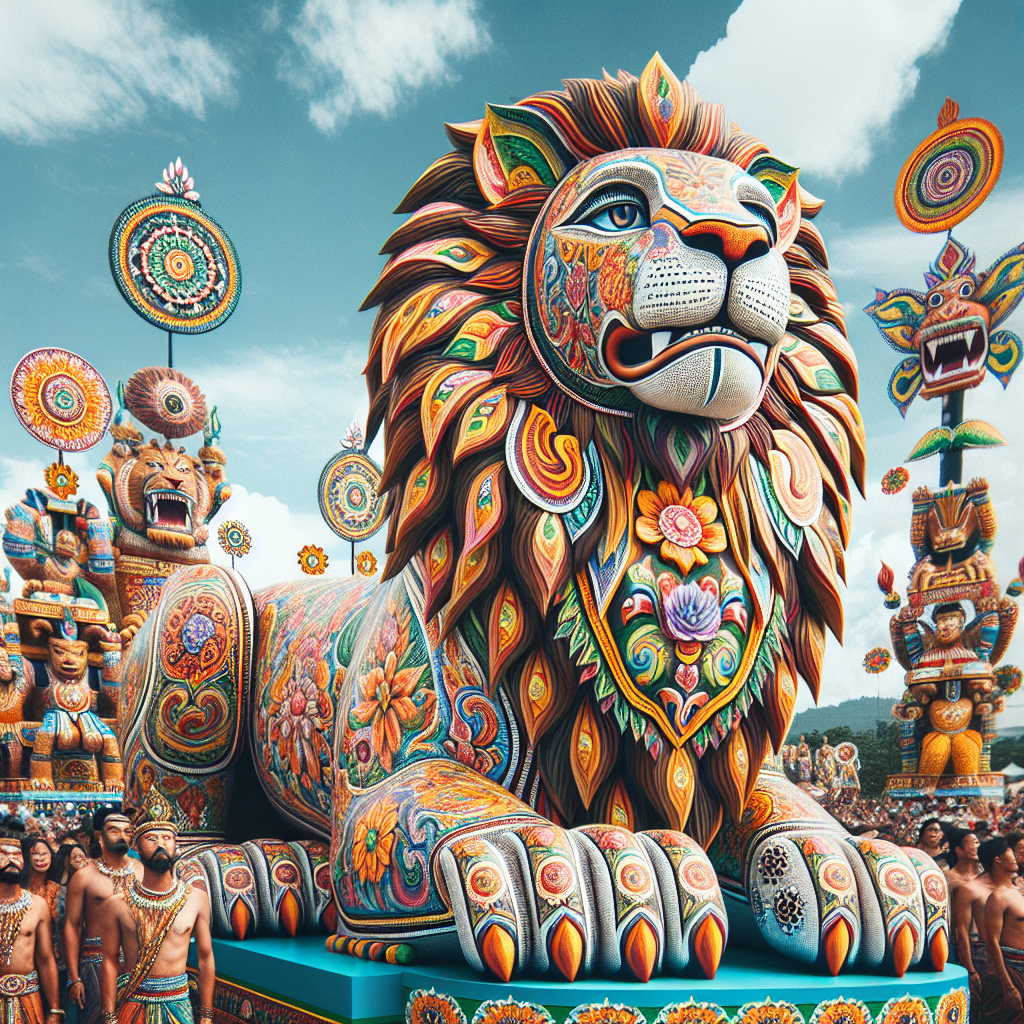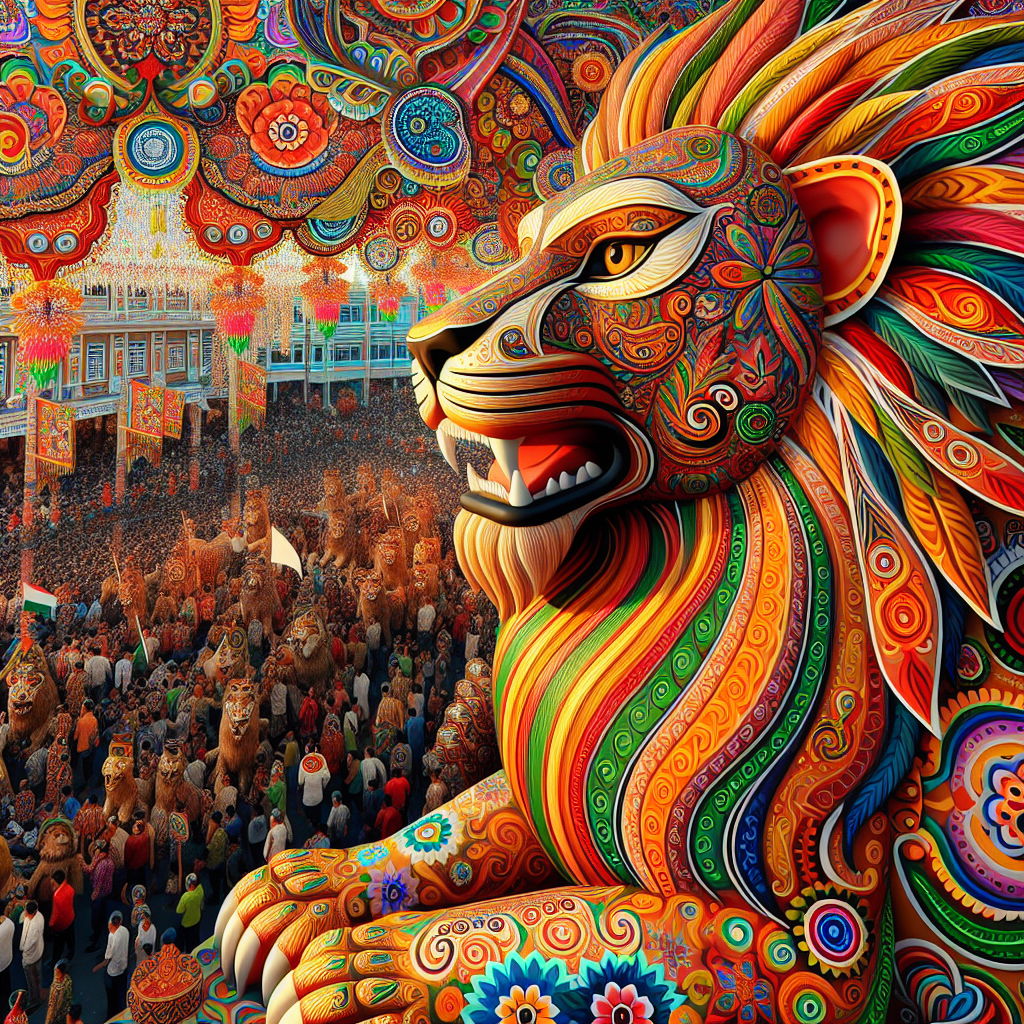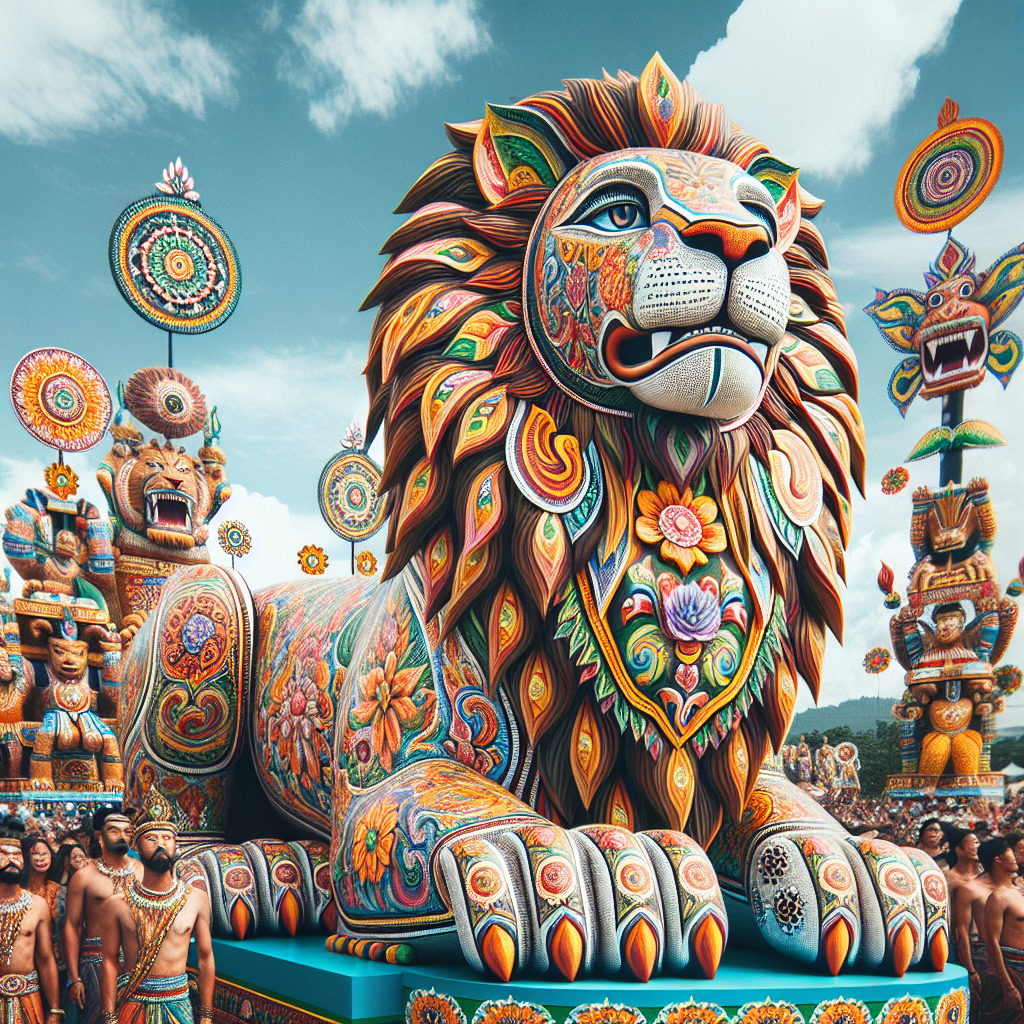Imagine yourself surrounded by colorful traditional costumes, vibrant music, and the captivating roar of lions. Lion Festivals bring together communities from all corners of the globe to not only celebrate the majestic king of the jungle, but also to raise awareness about conservation efforts. These festivals serve as a platform for people to come together, learn about the importance of protecting lions, and actively contribute to safeguarding their habitats. With an array of cultural activities, breathtaking performances, and engaging educational programs, Lion Festivals are not just celebrations, but also powerful catalysts for change. Step into this captivating world where conservation and community intertwine, and get ready to be inspired by the true spirit of these extraordinary events.

Introduction to Lion Festivals
Lion festivals hold a significant place in cultures around the world, serving as a symbol of strength, power, and community. These celebrations not only showcase the richness of cultural diversity but also play a vital role in raising awareness about lion conservation efforts. In this article, we will delve into the significance of lion festivals, their history and origin, as well as explore the cultural diversity represented in these vibrant celebrations.
The significance of lion festivals
Lion festivals carry immense importance in various cultures, representing a range of values and beliefs. The lion is often revered for its majestic qualities, embodying courage, nobility, and leadership. By celebrating these festivals, communities not only honor these extraordinary creatures but also strengthen their connection to nature and wildlife. Lion festivals provide an opportunity for people to come together, fostering a sense of unity and pride in their cultural heritage.
History and origin of lion festivals
The origins of lion festivals can be traced back to ancient civilizations, where the lion held a prominent place in mythology and folklore. In many African cultures, the lion is regarded as a sacred animal, symbolizing royalty and divine power. In contrast, Asian cultures often associate the lion with warding off evil spirits and bringing good luck. These diverse interpretations have shaped the traditions and rituals of lion festivals over time, adding depth and uniqueness to each celebratory event.
Cultural diversity in lion festivals
One of the remarkable aspects of lion festivals is the incredible diversity they showcase. From the lion dance in China to the Lion’s Head Festival in Sri Lanka, each culture brings its distinct flair to the celebration. The dances, costumes, and music vary from one region to another, reflecting the local customs and traditions. These festivals serve as a platform for cultural exchange and understanding, promoting diversity and inclusivity.
Conservation Efforts
Conservation efforts lie at the heart of lion festivals, as communities recognize the need to protect these magnificent creatures and their habitats. Through community-led conservation initiatives, these festivals serve as a catalyst for instilling a sense of responsibility and stewardship towards lions and their ecosystems.
Community-led conservation initiatives
Lion festivals often emerge as a result of collaborative efforts between local communities and conservation organizations. These initiatives empower communities to actively participate in conservation efforts, fostering a sense of ownership and responsibility. By involving the local population in the decision-making process, these initiatives ensure that conservation strategies are tailored to the specific needs of the region. This bottom-up approach not only leads to more effective conservation practices but also promotes sustainable development within the community.
Impact of lion festivals on conservation
Lion festivals play a crucial role in raising awareness about the threats faced by lions and their habitats. Through vibrant parades, performances, and educational programs, these celebrations create a platform for dialogue and engagement. They provide an opportunity for conservation organizations to disseminate knowledge, share success stories, and highlight the importance of preserving lion populations. The festivities bring together people from different walks of life, fostering a collective commitment towards lion conservation.
Conservation partnerships and collaborations
Lion festivals have also paved the way for collaborations between conservation organizations, governments, and local communities. These partnerships leverage resources, knowledge, and expertise to enhance conservation efforts on a larger scale. By working together, these stakeholders can implement sustainable practices, tackle poaching, facilitate habitat restoration, and promote responsible tourism. The power of these collaborations lies in their ability to achieve long-term conservation goals and ensure the survival of lions for generations to come.
Celebration of Lions
The celebration of lions is at the core of these festivals, with rituals and performances that transcend cultural boundaries. These festivities serve as a vibrant expression of traditions, customs, and the collective admiration for the king of the animal kingdom.
Traditional rituals and performances
Lion festivals are characterized by a myriad of traditional rituals and performances that captivate the senses and tell stories of ancient cultures. The lion dance, a prominent feature in many Asian festivals, involves performers dressed in elaborate lion costumes, mimicking the movements and behavior of the majestic big cat. Drums, cymbals, and firecrackers accompany the dance, creating a lively atmosphere filled with energy and excitement. Other rituals may include lion blessings, processions, and ceremonial offerings, each holding its own cultural significance.
Symbolism and symbolism in lion festivals
Symbolism plays a significant role in lion festivals, with deep meanings woven into the fabric of each celebration. The lion itself represents various virtues, such as strength, courage, and wisdom. The vibrant colors of the costumes often hold symbolic significance, reflecting cultural beliefs or historical events. For example, red is commonly associated with good luck and fortune in many Asian cultures, while white may symbolize purity and divinity. Through these symbols, lion festivals convey the essence of cultural heritage and serve as a reminder of the values cherished by the community.
Role of lion festivals in cultural preservation
Lion festivals serve as a platform for preserving cultural traditions and passing them down to future generations. By showcasing the rich tapestry of rituals, dances, and music, these celebrations ensure that cultural heritage remains alive and vibrant. The younger generations have the opportunity to witness and participate in these festivities, fostering a sense of pride and connection to their roots. Lion festivals play a crucial role in cultural transmission, serving as a beacon of tradition and identity amidst a rapidly changing world.
Community Engagement
Beyond conservation, lion festivals bring a host of social and economic benefits to local communities. They provide a platform for community engagement, promoting sustainable livelihoods and raising awareness about the importance of preserving both cultural heritage and natural resources.
Social and economic benefits for local communities
Lion festivals have a profound impact on local communities by fostering a sense of pride and belonging. These celebrations unite people from different backgrounds, promoting social cohesion and harmony. Local artisans and performers find opportunities to showcase their skills and talents, contributing to the preservation of traditional crafts. Additionally, the influx of visitors during these festivals stimulates the local economy, creating job opportunities and generating income for businesses in the area.
Promoting ecotourism and sustainable livelihoods
Lion festivals have the potential to spur ecotourism in regions where these majestic animals reside. Tourists flock to witness these extravagant celebrations, providing an economic incentive for communities to engage in sustainable practices and protect lion habitats. The revenue generated from responsible tourism can then be reinvested in conservation efforts, improving infrastructure, and supporting community development. By embracing ecotourism, local communities can ensure a harmonious coexistence between humans and lions while reaping the economic benefits.
Awareness and education on wildlife conservation
One of the key aspects of lion festivals is their role in raising awareness and educating the public about wildlife conservation. These celebrations provide a unique platform to disseminate information about the challenges faced by lions, the importance of their survival, and the need to protect their habitats. Interactive exhibits, educational workshops, and expert-led discussions contribute to the broader understanding of conservation issues. By fostering a sense of environmental stewardship, lion festivals create a lasting impact beyond the festivities.

Lion Festival Highlights
Lion festivals can be found in various corners of the globe, each offering its own unique traditions and activities. Let’s explore some of the top lion festivals around the world and the notable highlights that make them truly special.
Top lion festivals around the world
-
Chinese New Year: The lion dance is a central part of the Chinese New Year celebrations, symbolizing good luck and fortune for the year ahead. Performances can be witnessed across China and in Chinese communities worldwide.
-
Asakusa Samba Carnival: Held in Tokyo, Japan, this lively festival features a mix of Latin American and Japanese cultures, with colorful costumes, samba dancers, and energetic lion dances.
-
Sigiriya Perahera: Taking place in Sri Lanka, this traditional festival involves an enchanting procession with elaborately decorated elephants, fire dancers, and the iconic lion mask, symbolizing protection and blessings.
-
Bagh Festival: Celebrated in Rajasthan, India, this festival showcases a unique form of lion dance called ‘Bagh Natya.’ Performers dressed as lions dance to traditional music, portraying mythological stories and cultural anecdotes.
Notable traditions and activities in lion festivals
Apart from the mesmerizing lion dances, lion festivals present a plethora of traditions and activities that offer a rich cultural experience. These may include art exhibitions, craft fairs, traditional music performances, martial arts demonstrations, and culinary delights. Additionally, lion blessings, processions through city streets, and interactions with performers provide an immersive experience for festival-goers. Every festival presents a tapestry of customs that unfurl the true spirit of lion celebrations.
Challenges and Future Outlook
While lion festivals bring joy and conservation benefits to communities, they also face challenges that need to be addressed to ensure their sustainability and ethicality. Balancing cultural traditions with conservation efforts, addressing ethical concerns, and embracing innovation will shape the future of these celebrations.
Balancing cultural traditions and conservation
One of the primary challenges faced by lion festivals is finding a balance between preserving cultural traditions and promoting sustainable conservation practices. It is crucial to ensure that traditional rituals and performances do not exploit or harm the animals involved. Collaborations between local communities, conservation organizations, and festival organizers are vital to create guidelines that respect cultural heritage while prioritizing animal welfare and conservation ethics.
Addressing ethical concerns in lion festivals
Certain aspects of lion festivals, such as the use of captive animals or harmful practices, raise ethical concerns. It is essential to reassess these issues and modify practices to align with ethical standards. Emphasizing education and awareness about animal welfare can bring about a shift towards cruelty-free celebrations. Encouraging the use of alternative materials for costumes and props, promoting responsible captive breeding programs, and supporting sanctuaries that provide a safe and natural environment for animals are crucial steps in addressing ethical concerns.
Innovations and adaptations for the future
To ensure the longevity of lion festivals, it is essential to embrace innovation and adapt to changing times. Incorporating sustainable practices into festival management, such as reducing waste, promoting renewable energy sources, and implementing carbon offset programs, can minimize the environmental footprint of these events. Additionally, leveraging technology, such as virtual reality experiences or interactive educational platforms, can enhance the impact of festivals, reaching a wider audience and fostering a global community committed to lion conservation.
Conclusion
Lion festivals serve as an intersection where conservation, culture, and community converge. These celebrations not only honor the majestic lion but also bring people together, fostering unity, pride, and a shared commitment to conservation. By embracing cultural diversity, promoting community engagement, and inspiring future generations, lion festivals have the power to safeguard both natural and cultural heritage. As we navigate the challenges ahead, it is imperative to uphold the spirit of these celebrations while ensuring the well-being of the lion and its ecosystem. Together, through these vibrant festivities, we can celebrate the magnificence of lions and work towards a future where they continue to thrive.

